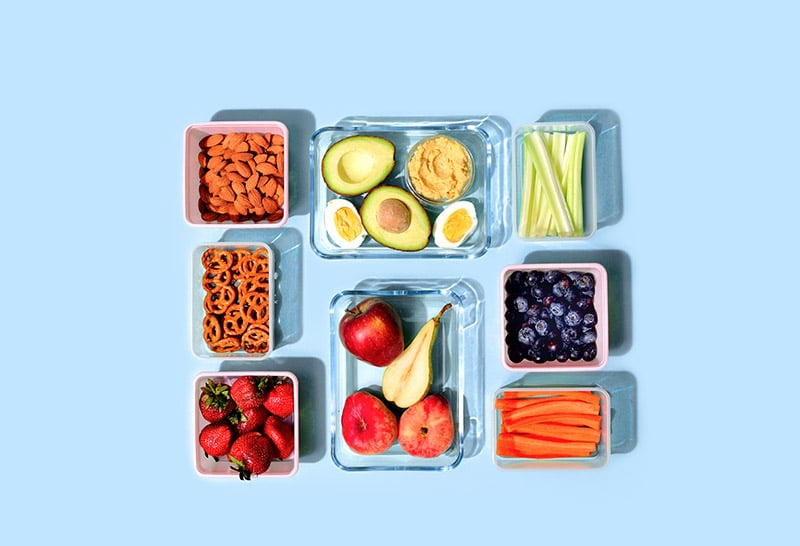Taking care of ourselves is crucial during the COVID-19 pandemic, and that starts with eating healthy food
“Now is a more important time than ever to focus on feeding our bodies well,” says Carey Shore, MS, RD, LD, dietitian and wellness coach at Methodist Health System. “Good nutrition helps maintain a strong immune system, which is vital when fighting illness.”
Shore recommends fueling up every few hours with the usual nutritious staples: vegetables, fruits, whole grains, lean proteins, and low-fat dairy products.
If you’re staying home, resist the urge to snack mindlessly by creating an eating schedule, she says.
“Fuel up every few hours with a nutritious meal or snack,” Shore says. “This will help you to prevent overeating, especially with foods that may cause more harm than good.”
Buy non-perishable foods
Cheryl Vera-Burkhalter, MD, family physician on the medical staff at Methodist Dallas Medical Center, recommends buying non-perishable foods with a long shelf life, such as beans, trail mix, and soup. For healthier alternatives, she points to frozen vegetables and fruits, which can last for weeks.
Also, as shelter-in-place orders begin to take effect in Texas, Vera-Burkhalter says it’s a good idea to keep a month’s supply of prescription medications on hand.
Don’t forget over-the-counter remedies to fight minor illnesses and ailments, in addition to medications that patients may take on a daily basis, including aspirin, allergy pills, or pain relievers.
Find new ways to socialize
What we need to remember is taking care of ourselves still follows the same prescription as it did before this crisis: eat healthily, get some exercise, and be sure to get plenty of rest.
And we should all be on the lookout for new ways to connect with others. Social distancing, after all, doesn’t require isolation, thanks to the technology we all have at our fingertips.
“As people spend more time away from typical social outlets and even the usual errands and work, they won’t be seeing each other as much in person,” says Les Cler, MD, FACP, CPE, Chief Medical Officer at Methodist Dallas. “Stress and feelings of isolation can contribute to depression and all of those negative feelings tend to make for poorer physical health.”
It’s a shock to have some of our favorite means of fellowship suddenly become off-limits, whether it’s communing at church, socializing at the gym, or gathering with friends at a restaurant.
Connect with food
Food can be an outlet to connect with others. If you buy a bag of oranges or cook something healthy, share it with your neighbors. Find ways to connect through food without having to go out to dinner together.
Dr. Cler also suggests calling friends on the phone, just to check in, or using video chat programs like Skype or FaceTime to feel less isolated. And it’s a wonder how a simple walk can change your state of mind.
“While we shouldn’t be going to social gatherings right now, it is still good for most of us to get outside a little,” Dr. Cler says. “A walk down a sidewalk or in a park is still pretty safe. It can help with stress relief while reminding us that not everything has changed.”
Learn other ways to take care of your mental health during the COVID-19 pandemic.
About the author
 Jerri Locke is the director of Healthy Aging for Methodist Health System. She directs a membership program, Methodist Generations for adults who are at least 55 years of age. She is driven to provide quality programs to help the older adults maintain a healthy life. Jerri has a Bachelor’s in Education from Abilene Christian University, as well as a Masters in Rehabilitation Counseling from the University of North Texas and a Masters in Human Relations and Business from Amberton University. She was born and raised in Oak Cliff and values the diversity, history, and the community it provides. She’s a mom of two young adults, a foster mom to a variety of rescue dogs, and a part-time caregiver for her father.
Jerri Locke is the director of Healthy Aging for Methodist Health System. She directs a membership program, Methodist Generations for adults who are at least 55 years of age. She is driven to provide quality programs to help the older adults maintain a healthy life. Jerri has a Bachelor’s in Education from Abilene Christian University, as well as a Masters in Rehabilitation Counseling from the University of North Texas and a Masters in Human Relations and Business from Amberton University. She was born and raised in Oak Cliff and values the diversity, history, and the community it provides. She’s a mom of two young adults, a foster mom to a variety of rescue dogs, and a part-time caregiver for her father.

